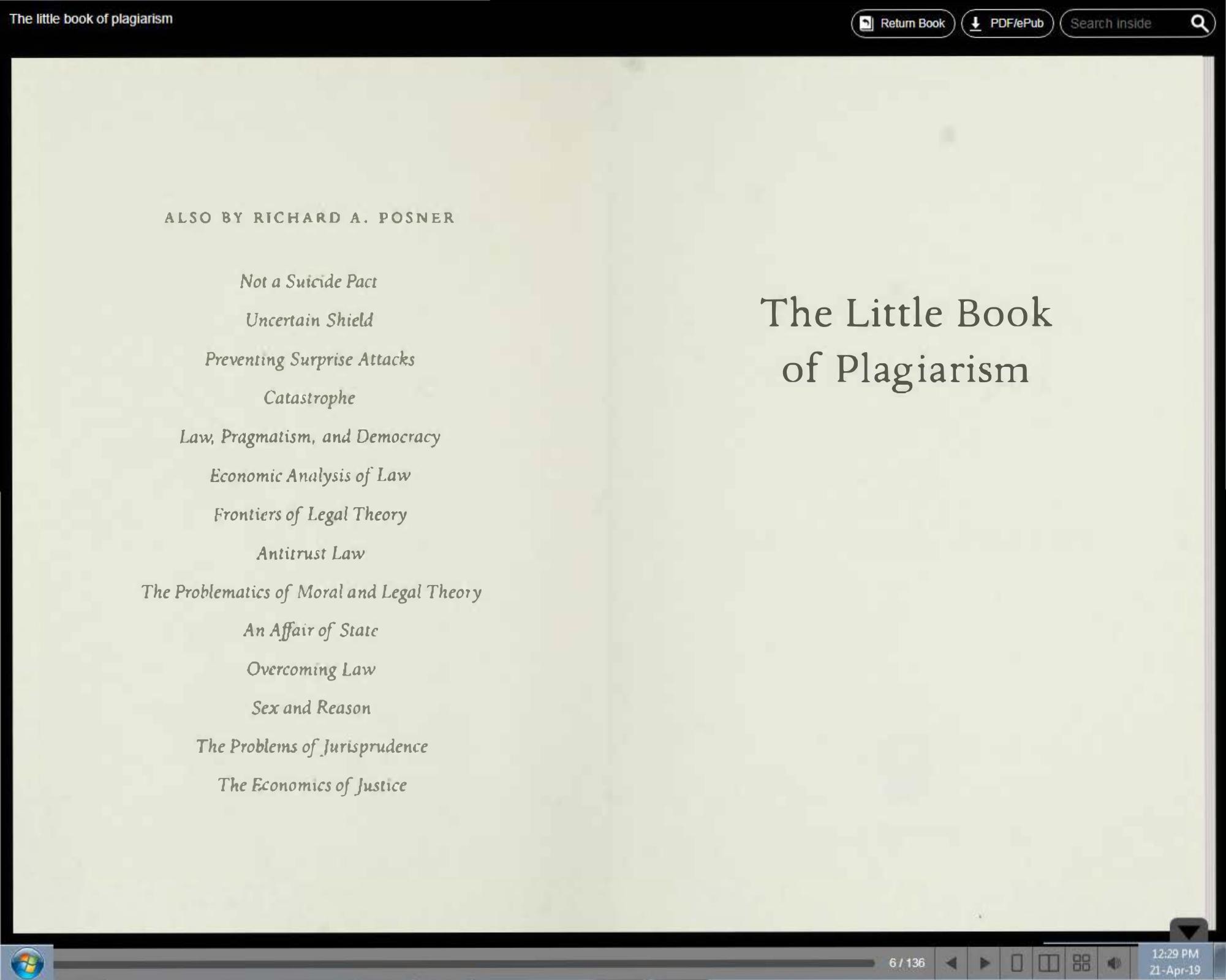The Little Book of Plagiarism by Richard A. Posner

Author:Richard A. Posner [Posner, Richard A.]
Language: eng
Format: epub, pdf
Publisher: Knopf Doubleday Publishing Group
Published: 2009-03-10T07:00:00+00:00
V
OURS IS A TIME and place in which market forces favor originality and in which a robust concept of plagiarism backs up the market valuation. But how grave is the problem of plagiarism today? This depends in part on the breadth of the concept, which must not be exaggerated. Creative imitation, though more narrowly conceived than in Shakespeare's day, is not plagiarism. Nor is self-plagiarism, other than in exceptional cases. And caution must be the watchword when the concept of plagiarism is extended from literal copying to the copying of ideas. Another term for copying an idea, as distinct from copying the specific form of words or sounds or images in which it is expressed, is disseminating an idea. If one needs a license to repeat another person's idea, or if one risks ostracism by one's professional community for failing to credit an idea to its originator, who may be forgotten or unknown, the dissemination of ideas is impeded.
We should also be wary of “plagiarism denouncing” as a device of professional self-promotion. Journalists have a bad reputation for accuracy; and historians in our postmodernist era are suspected of having embraced an extreme form of relativism and of having lost their regard for facts. (We shall see that some postmodernists do indeed question the concept of plagiarism.) Both professions hope by taking a hard line against plagiarism and fabrication to reassure the public that their practitioners are serious diggers after truth whose efforts, a form of “sweat equity,” deserve protection against copycats.
There is also a crowding phenomenon that would make plagiarism, if defined too broadly, unavoidable. The desire to be original and the desire to be successful are not wholly compatible. Publishers are not looking for works to publish that are completely original, because they can have no idea how the reading public will respond; in fact avant garde work does not achieve commercial success until it has ceased to be in advance of popular taste. Publishers are looking for the new thing that's enough like the old thing to be likely to gain early acceptance by the market, yet enough unlike it to satisfy the public's taste for variety. The creation of such works would be stymied by equating imitation to plagiarism. Creative imitation is not just a classical or Renaissance legacy; it is a modern market imperative.
The need to walk a fine line is even more acute in the movie industry, because the typical studio makes only a few movies a year, each of which may be enormously expensive. The risk and cost of failure are both very great; hence the extraordinary degree to which new movies are based on books, plays, and, especially, earlier movies that have proved to be commercial successes, hence, too, the remaking of the same movie (The Twenty-Nine Steps, King Kong, Henry V), the endless sequels, and the incessant repetition of successful formulas.
We should also be careful not to confuse innocent forms of copying with plagiarism, but at the same time not to equate innocent to unintentional.
Download
The Little Book of Plagiarism by Richard A. Posner.pdf
This site does not store any files on its server. We only index and link to content provided by other sites. Please contact the content providers to delete copyright contents if any and email us, we'll remove relevant links or contents immediately.
Cecilia; Or, Memoirs of an Heiress — Volume 1 by Fanny Burney(32546)
Cecilia; Or, Memoirs of an Heiress — Volume 2 by Fanny Burney(31943)
Cecilia; Or, Memoirs of an Heiress — Volume 3 by Fanny Burney(31929)
The Great Music City by Andrea Baker(31916)
We're Going to Need More Wine by Gabrielle Union(19034)
All the Missing Girls by Megan Miranda(15951)
Pimp by Iceberg Slim(14487)
Bombshells: Glamour Girls of a Lifetime by Sullivan Steve(14054)
For the Love of Europe by Rick Steves(13905)
Talking to Strangers by Malcolm Gladwell(13346)
Norse Mythology by Gaiman Neil(13345)
Fifty Shades Freed by E L James(13232)
Mindhunter: Inside the FBI's Elite Serial Crime Unit by John E. Douglas & Mark Olshaker(9318)
Crazy Rich Asians by Kevin Kwan(9277)
The Lost Art of Listening by Michael P. Nichols(7490)
Enlightenment Now: The Case for Reason, Science, Humanism, and Progress by Steven Pinker(7306)
The Four Agreements by Don Miguel Ruiz(6744)
Bad Blood by John Carreyrou(6611)
Weapons of Math Destruction by Cathy O'Neil(6264)
